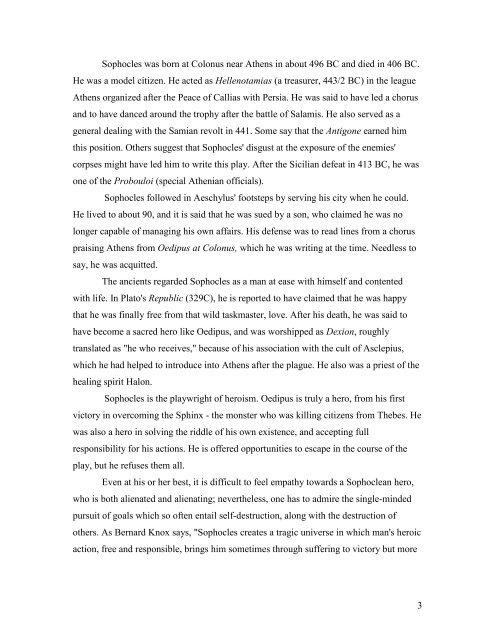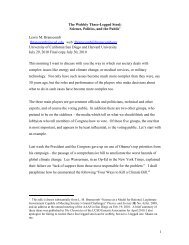1 Sophocles' Oedipus Tyrannus Introduced and Translated by ...
1 Sophocles' Oedipus Tyrannus Introduced and Translated by ...
1 Sophocles' Oedipus Tyrannus Introduced and Translated by ...
Create successful ePaper yourself
Turn your PDF publications into a flip-book with our unique Google optimized e-Paper software.
Sophocles was born at Colonus near Athens in about 496 BC <strong>and</strong> died in 406 BC.<br />
He was a model citizen. He acted as Hellenotamias (a treasurer, 443/2 BC) in the league<br />
Athens organized after the Peace of Callias with Persia. He was said to have led a chorus<br />
<strong>and</strong> to have danced around the trophy after the battle of Salamis. He also served as a<br />
general dealing with the Samian revolt in 441. Some say that the Antigone earned him<br />
this position. Others suggest that <strong>Sophocles'</strong> disgust at the exposure of the enemies'<br />
corpses might have led him to write this play. After the Sicilian defeat in 413 BC, he was<br />
one of the Probouloi (special Athenian officials).<br />
Sophocles followed in Aeschylus' footsteps <strong>by</strong> serving his city when he could.<br />
He lived to about 90, <strong>and</strong> it is said that he was sued <strong>by</strong> a son, who claimed he was no<br />
longer capable of managing his own affairs. His defense was to read lines from a chorus<br />
praising Athens from <strong>Oedipus</strong> at Colonus, which he was writing at the time. Needless to<br />
say, he was acquitted.<br />
The ancients regarded Sophocles as a man at ease with himself <strong>and</strong> contented<br />
with life. In Plato's Republic (329C), he is reported to have claimed that he was happy<br />
that he was finally free from that wild taskmaster, love. After his death, he was said to<br />
have become a sacred hero like <strong>Oedipus</strong>, <strong>and</strong> was worshipped as Dexion, roughly<br />
translated as "he who receives," because of his association with the cult of Asclepius,<br />
which he had helped to introduce into Athens after the plague. He also was a priest of the<br />
healing spirit Halon.<br />
Sophocles is the playwright of heroism. <strong>Oedipus</strong> is truly a hero, from his first<br />
victory in overcoming the Sphinx - the monster who was killing citizens from Thebes. He<br />
was also a hero in solving the riddle of his own existence, <strong>and</strong> accepting full<br />
responsibility for his actions. He is offered opportunities to escape in the course of the<br />
play, but he refuses them all.<br />
Even at his or her best, it is difficult to feel empathy towards a Sophoclean hero,<br />
who is both alienated <strong>and</strong> alienating; nevertheless, one has to admire the single-minded<br />
pursuit of goals which so often entail self-destruction, along with the destruction of<br />
others. As Bernard Knox says, "Sophocles creates a tragic universe in which man's heroic<br />
action, free <strong>and</strong> responsible, brings him sometimes through suffering to victory but more<br />
3









